Rumination refers to repetitive thinking or dwelling on negative thoughts and feelings, the things that cause them, and what they can lead to.
Rumination anchors your focus on the negative aspects of your life. Ruminative thinking can take a toll on your mental health and well-being and worsen mental health conditions such as anxiety and depression.
When a person ruminates, it can be tough to get out of a negative thought cycle, and very easy to fall is a low mood and depressive state.
Learning to interrupt ruminative thinking and find healthy coping mechanisms can help a person improve their mental well-being and live more presently.
It is important to recognize that rumination and rumination disorder are different.
Rumination disorder is an eating disorder that involves frequent regurgitation of food. By contrast, ruminating is a cycle of thinking that can worsen symptoms of mental health disorders.
Ruminating as a type of thinking is most commonly a symptom of anxiety disorders like generalized anxiety disorder or obsessive-compulsive disorder, along with depressive disorders.
Rumination itself is not a mental illness. However, it is commonly a symptom of numerous mental health conditions.
If you find yourself experiencing ruminating thoughts frequently, you should talk to a professional, like your healthcare provider, a professional in the psychiatry field, or a mental health professional, who can help you identify any underlying problems and get any medical advice you may need.
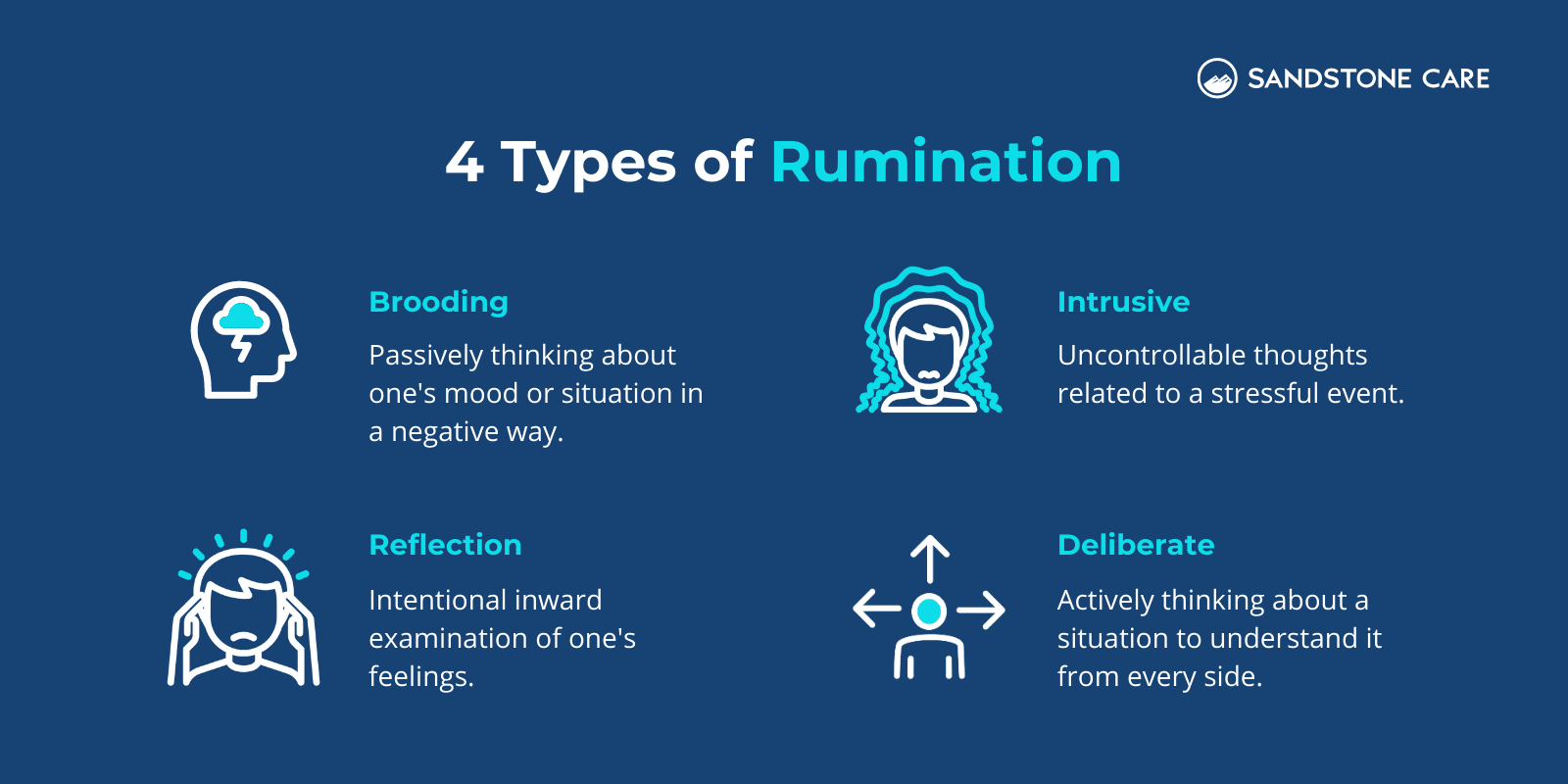
The four types of rumination include:
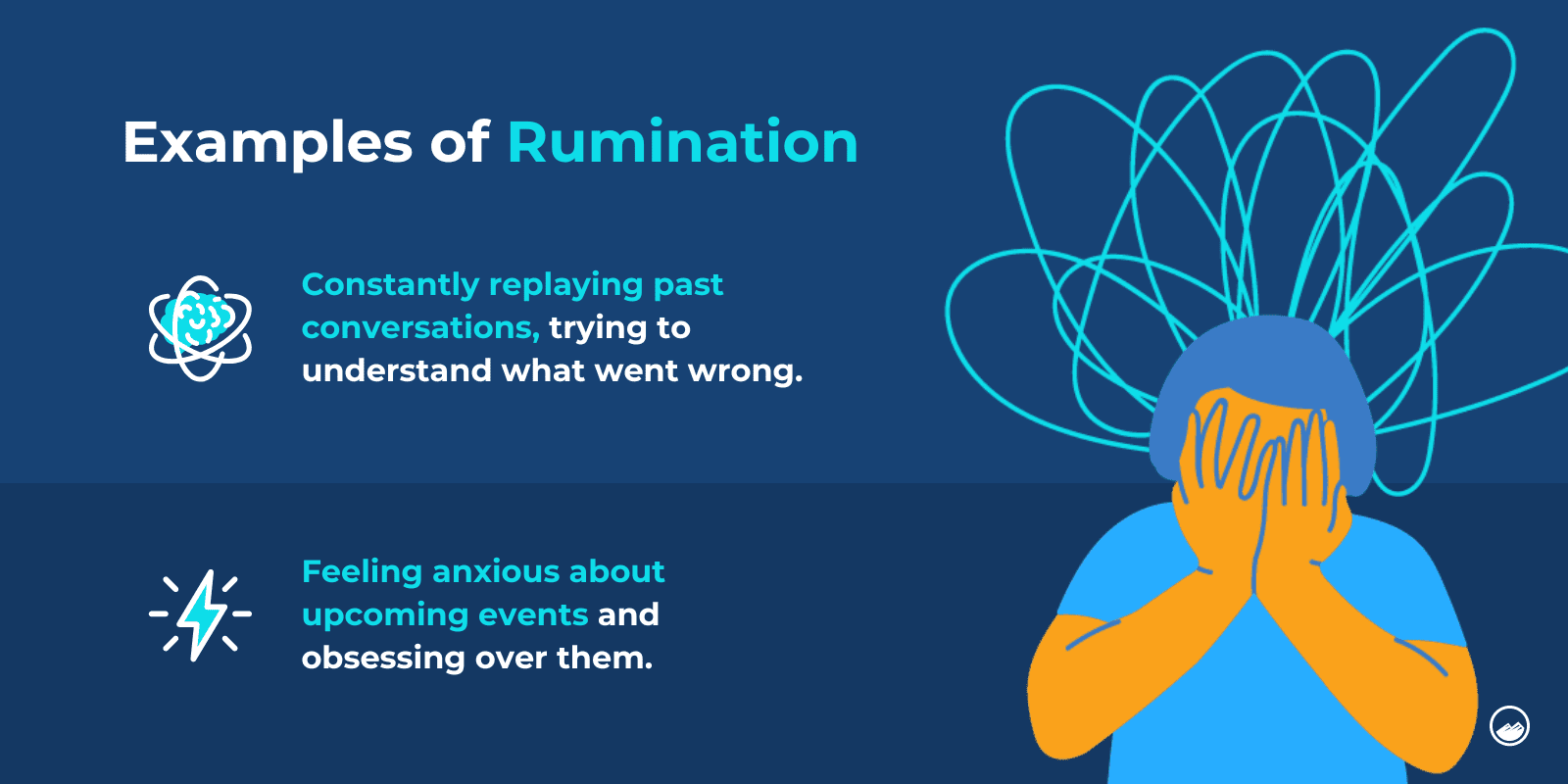
Ruminating thoughts aren’t the same for everyone and can look very different from person to person.
What you ruminate about may be the opposite of what another person ruminates about.
For one person, it may mean constantly replaying a conversation you had with someone in your head. Possibly, there was conflict, or the person said hurtful things.
These words may constantly replay in your head because you are trying to understand why these things were said or what you think you did wrong.
Another person may ruminate about an upcoming event. They may be feeling anxious about going, may not want to see someone that will be there, or could be trying to make sure everything is perfect and goes the way they want it to.
You replay scenarios in your head for many different reasons, even if you don’t want to.
As a human, it is not abnormal to try to understand why something happened the way it did or understand why you are feeling the way you do.
By replaying scenarios in your head, you are trying to grasp where things may have gone wrong or what you can do in the future to prevent it from happening again.
You may be replaying scenarios in your head repetitively as a way to cope.
It may offer temporary relief to anxiety or depression because you feel that the more you understand it, the better you can change it in the future.
However, ruminating thoughts often lead to unhealthy cycles that worsen your mental health.
Replaying scenarios and negative events in your head, over and over again, can keep you stuck in a harmful state of mind, whether you want to be or not.
Ruminating thoughts can come from a number of different things, including:
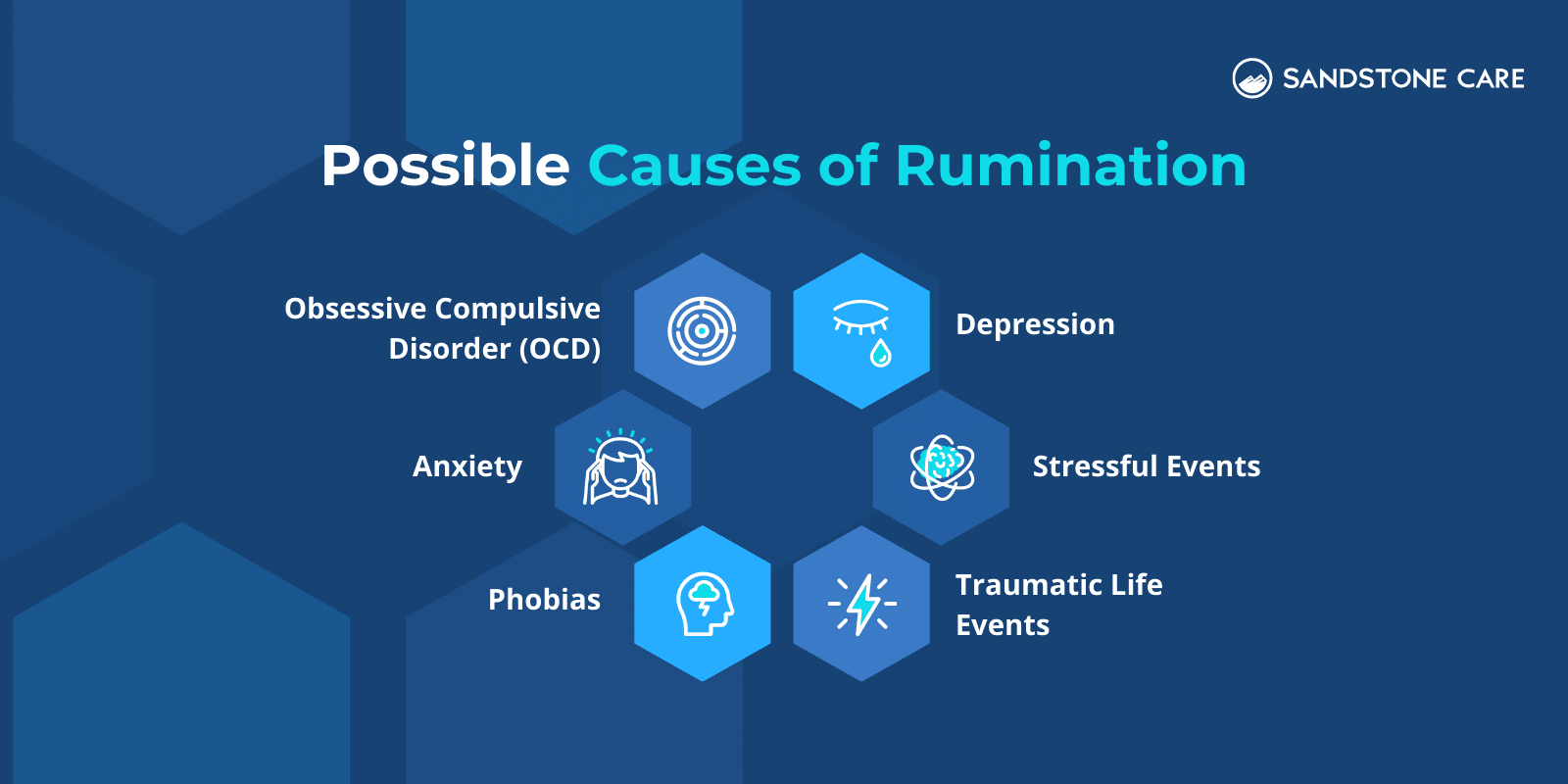
People often ruminate because they are trying to make sense of something that happened to them.
They believe that replaying the situation over and over again in their head may give them some kind of clarity and answer to their problem when really, it can do the opposite.
Other common causes of ruminating thoughts are stressful and traumatic events.
A person’s experiences can cause a lot of difficult feelings and emotions that are difficult to process.
Rumination may be a person’s way of coping with these negative emotions because they are trying to figure out ways to avoid the same thing happening in the future, but these thought processes only become more harmful over time.
Lastly, rumination is commonly a symptom of mental health illnesses like anxiety and depression. Depressive rumination can often prolong depressive symptoms and episodes of sadness.
If you are experiencing ruminating thoughts, reach out for professional support to help determine if there may be any underlying causes.
Everybody’s triggers are different.
Some people may experience rumination from common and daily stressors. For others, it may be a person, place, or thing that may remind stressful or traumatic experiences.
It is important to learn your triggers so that you can learn ways to cope with them effectively.
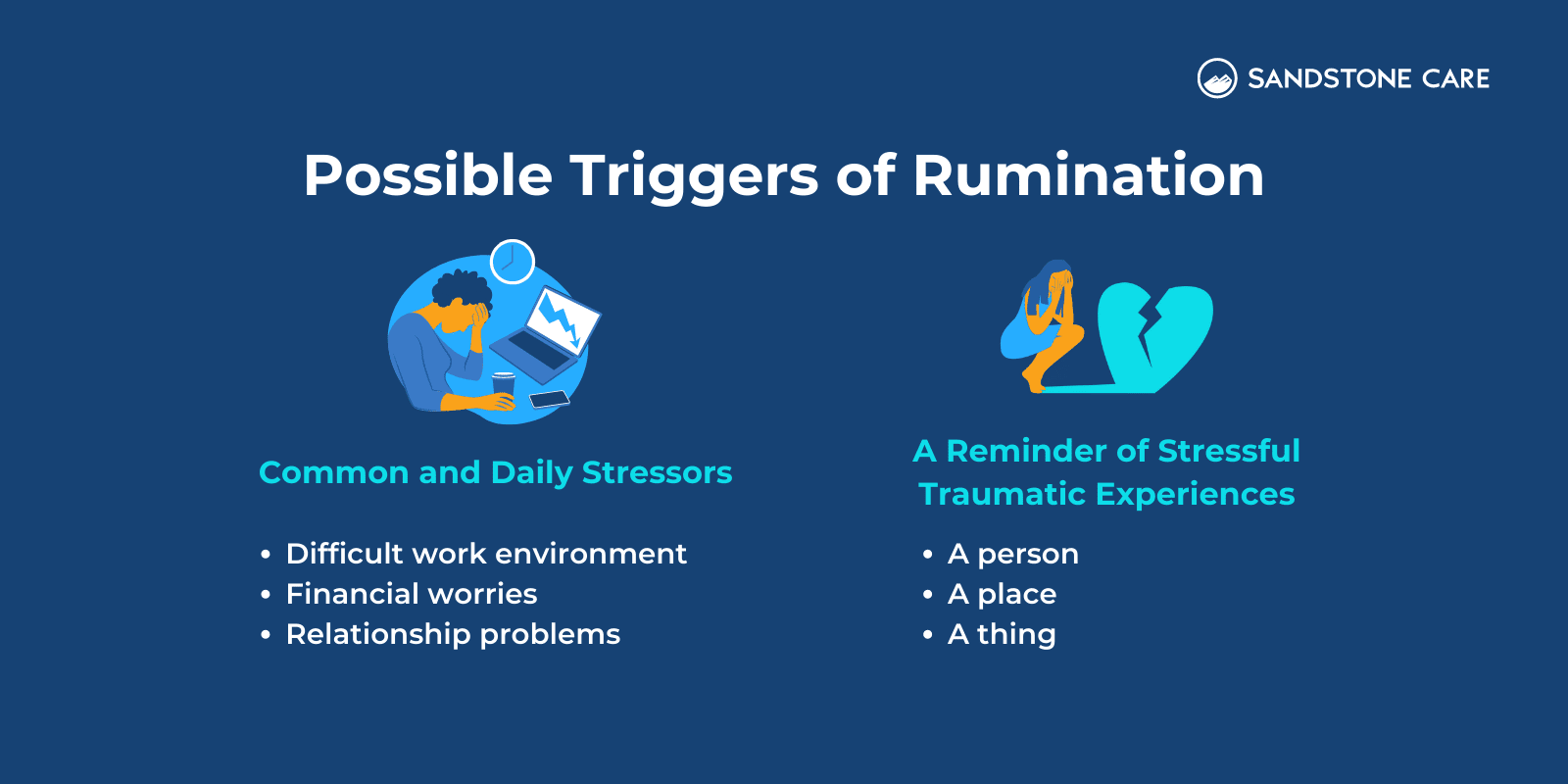
Some of the most common effects of rumination can include:
Rumination can have long-term effects on both your physical and mental health.
Not only can rumination cause distress and a negative downward spiral of thinking, but it can also have lasting effects on your body and mind.
Rumination can contribute to and worsen mental health conditions such as stress and anxiety.
It can also affect a person’s eating habits, which can lead to malnutrition or weight changes.
Rumination can also affect a person’s home or school life. It can make life very difficult to perform well as your mind is consumed with never-ending negative thoughts.
According to Cognitive, Affective, & Behavioral Neuroscience, rumination likely involves a range of processes that are associated with attention, self-referential processing, and memory recalling.
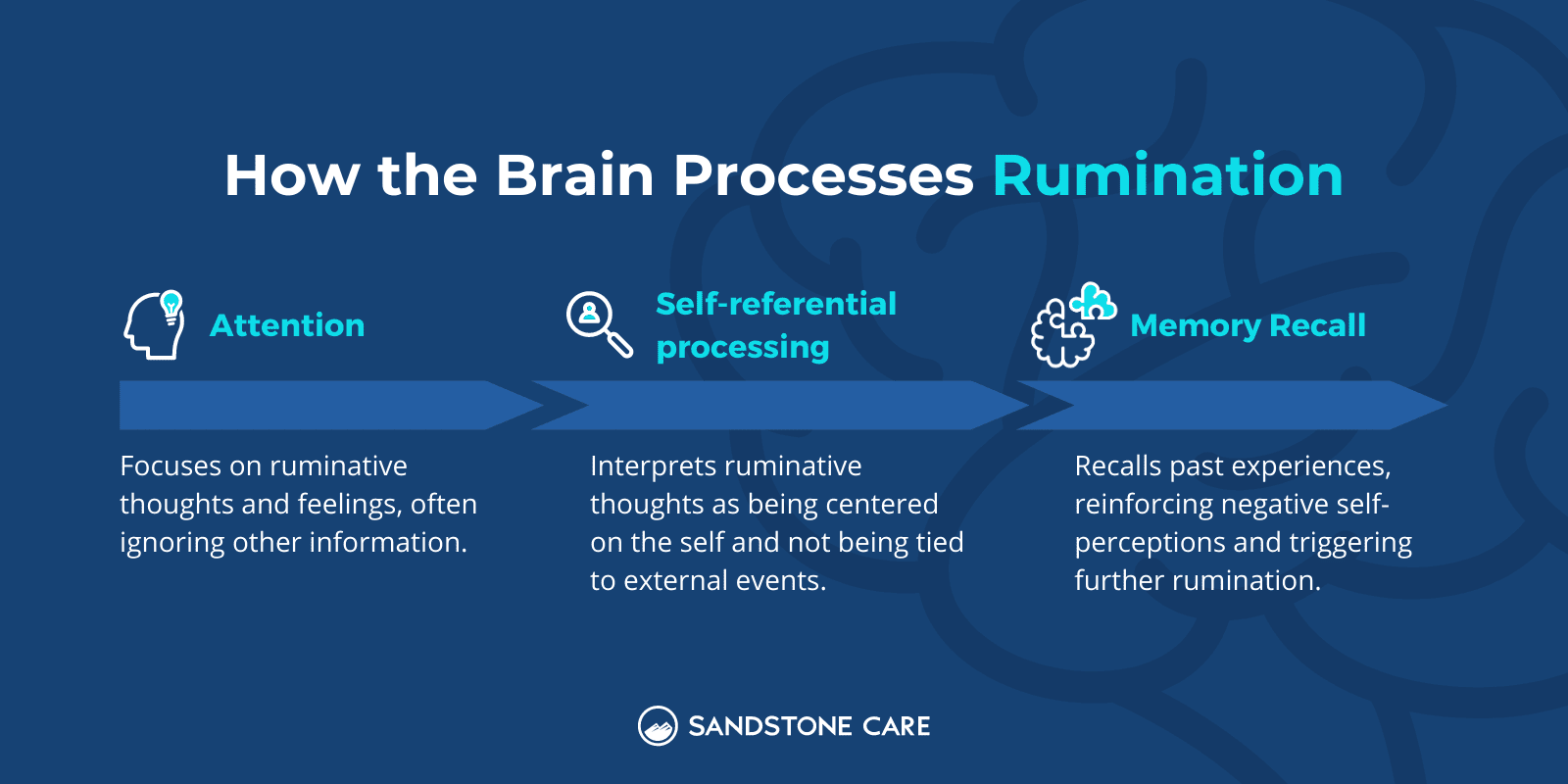
Ruminating thoughts can contribute to and worsen depression.
Research shows that ruminative thinking can lead to the onset of depressive disorder.
Rumination is considered to be a maladaptive coping mechanism that involves repetitive and unproductive analysis of a person’s negative emotional state, which worsens an already low mood.
Individuals who ruminate are fixated on these negative thoughts and are preoccupied with problem-solving.
Ruminating thoughts can lead to other mental illnesses other than depression, including:
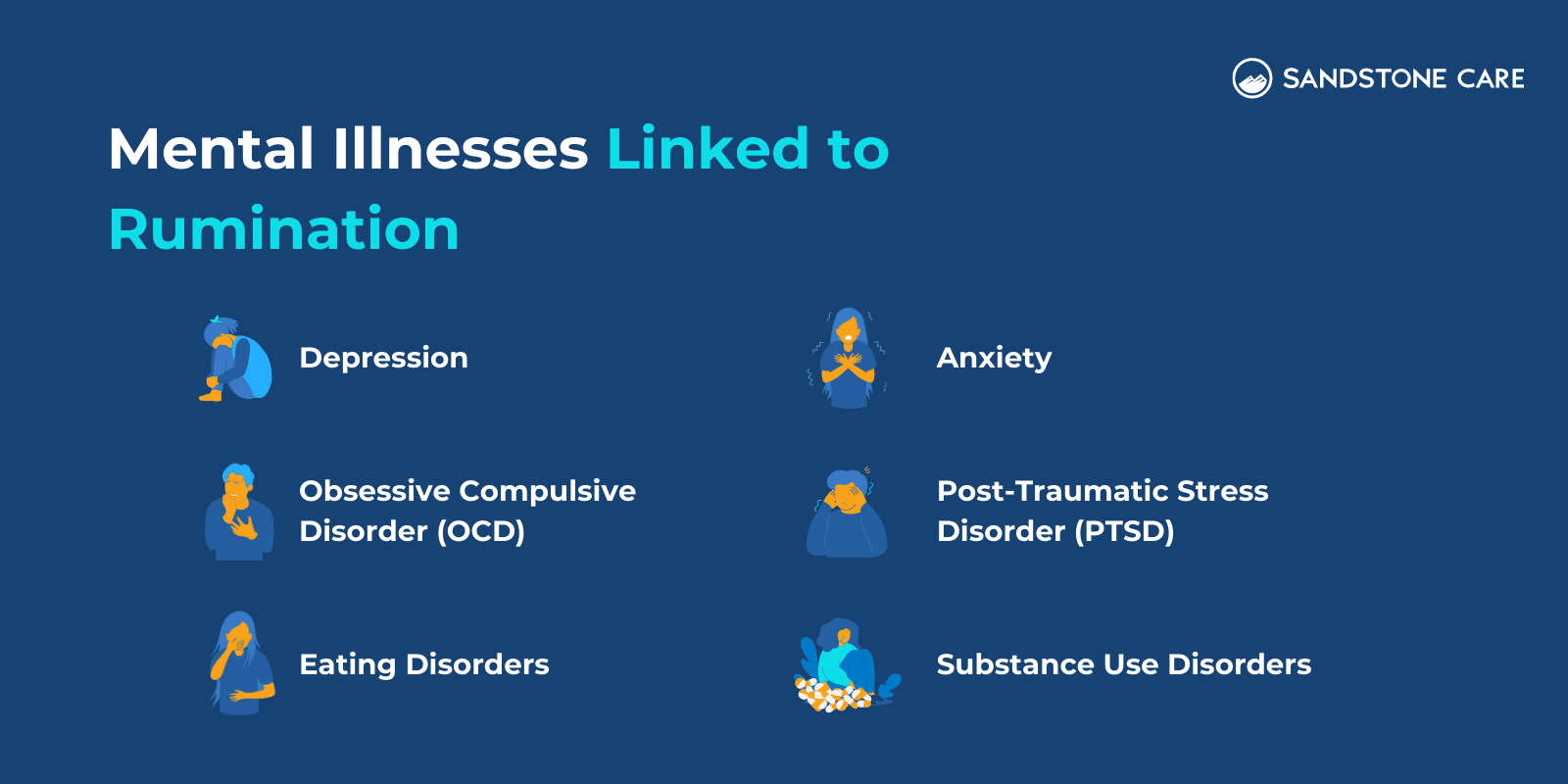
Rumination most often involves repetitive negative thinking, which can be harmful to your health and well-being.
While rumination is almost always negative, some people discuss the idea of positive rumination, where one focuses on thoughts that remind them of positive emotions.
Ruminating thoughts can become dangerous and put someone in a very bad and negative state of mind.
It can put a person at risk of self-harming behaviors or suicidal thoughts.
If you or a loved one are experiencing suicidal thoughts, call the National Suicide Prevention Lifeline at 988, or if you are in danger, call 911.
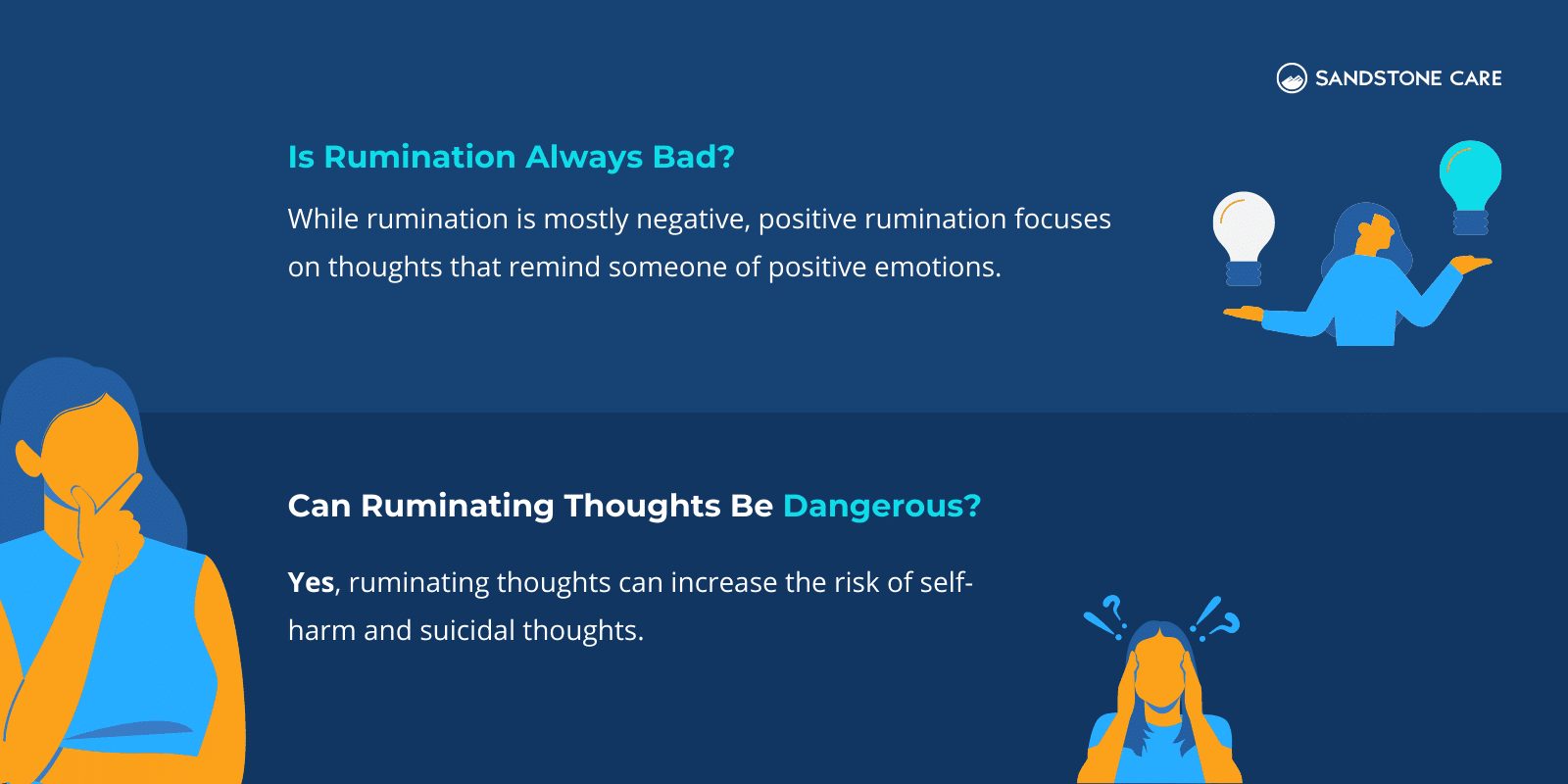
When it comes to obsessive-compulsive disorder (OCD), rumination involves excessive time thinking or worrying about specific thoughts or actions.
This repetitiveness can cause high amounts of distress to a person and can make it very hard to function daily.
OCD and rumination are not the same exact thing. However, they do share some similarities.
One of the main differences between the two is that OCD involves intrusive and unwanted obsessions. With rumination, the thoughts can be self-perpetuating and can almost seem interesting to a person because they are trying to gain a better understanding of an experience.
OCD rumination can feel very stressful, and it can be hard to control your thoughts or find calmness because you get stuck in a loop of negative, repetitive thoughts.
For someone experiencing OCD rumination, it can feel like what seems like a never-ending search for an answer.
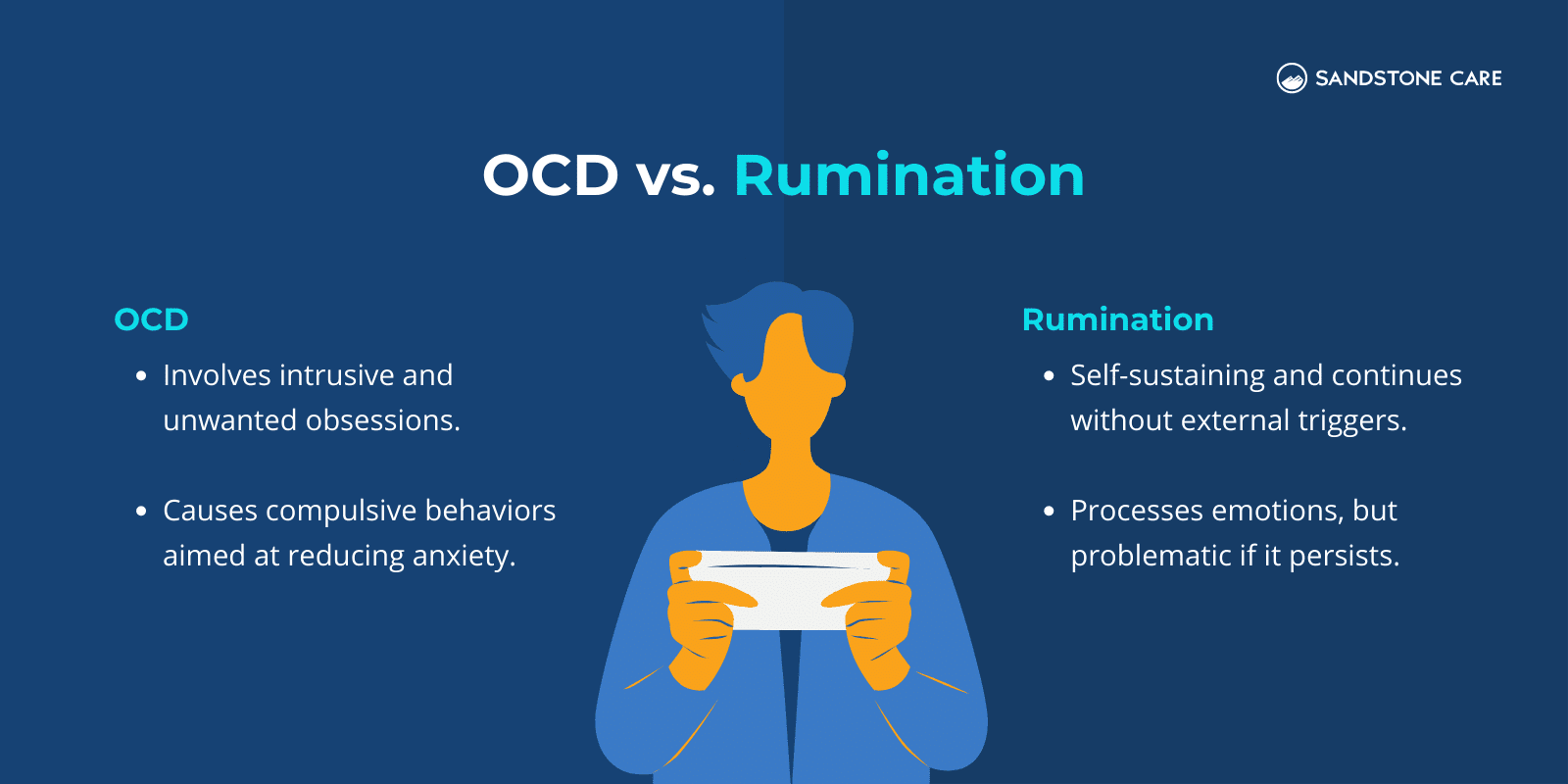
Some ways to help stop the cycle of OCD rumination can include:
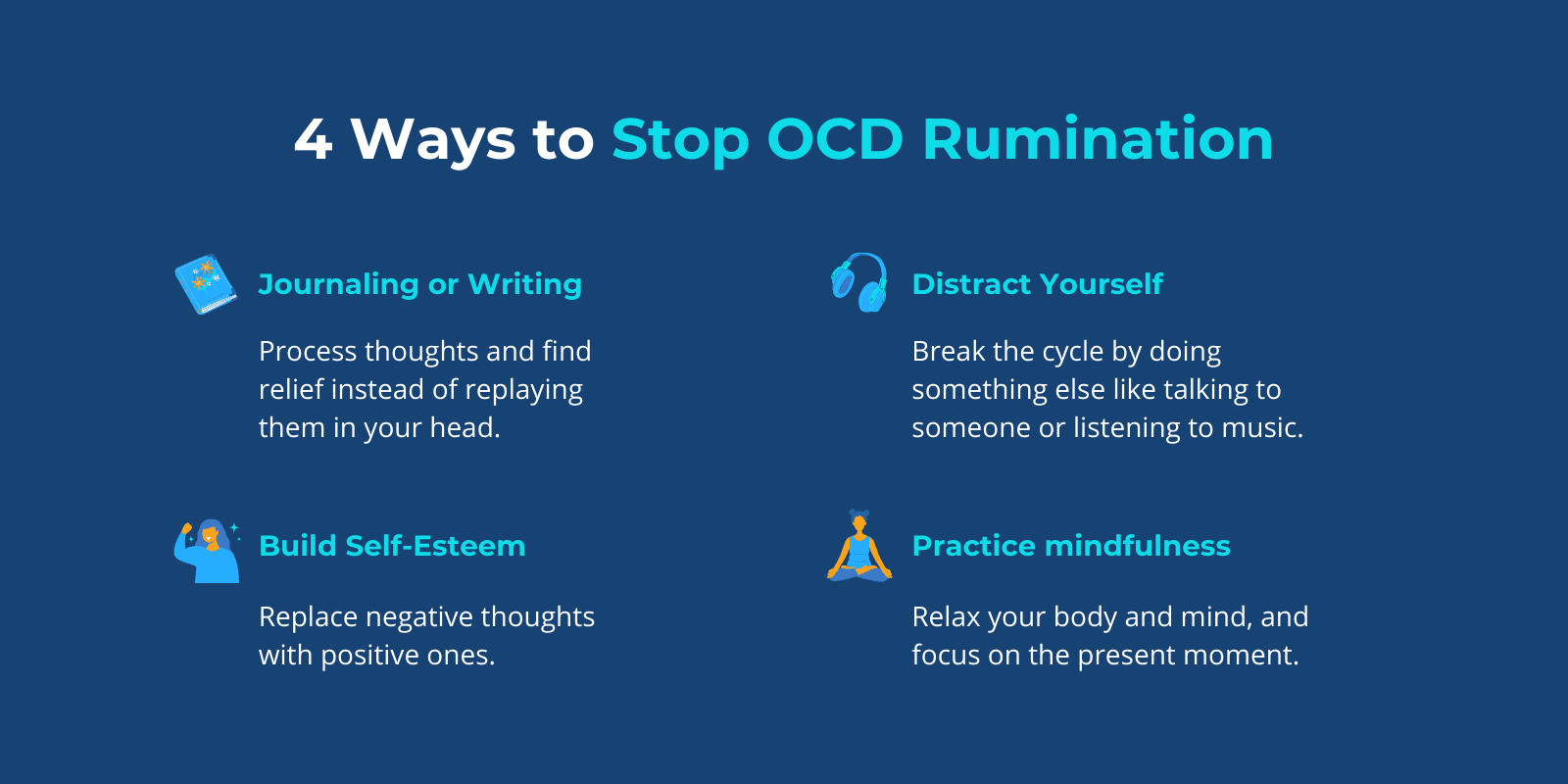
Rumination and OCD can cause distress and worsen the symptoms of OCD.
It can lead to a variety of intrusive thoughts that repeat themselves and lead a person into a negative mental state that can be very difficult to cope with.
Fortunately, support and therapies such as cognitive behavioral therapy (CBT) can be helpful in teaching a person healthy coping strategies for rumination and OCD.
Rumination is a symptom that can occur from anxiety.
Additionally, rumination can lead to and worsen anxiety disorders.
A person with anxiety experiences persistent worry that affects their daily life. With rumination, a person with anxiety will experience these repetitive thoughts and worries in their head over and over again.

When a person experiences rumination anxiety, it can be tough to control worrying thoughts.
Some ways to stop rumination anxiety is by taking a breath and trying to be present in each moment. Practicing mindfulness and relaxation techniques can help you find relief from anxiousness and worrying thoughts.
Another way to stop rumination anxiety is by finding ways to distract yourself and interrupt worrying thoughts. This may include things like calling a friend, doing things around the house, or possibly listening to music or watching a video.
If you feel that you are experiencing ruminating thoughts and anxiety, it can be helpful to consult with a healthcare professional and consider starting therapy.
Going to therapy can help you address any underlying problems that may be contributing to ruminating thoughts and also help you learn how to identify, cope and restructure negative thought processes.
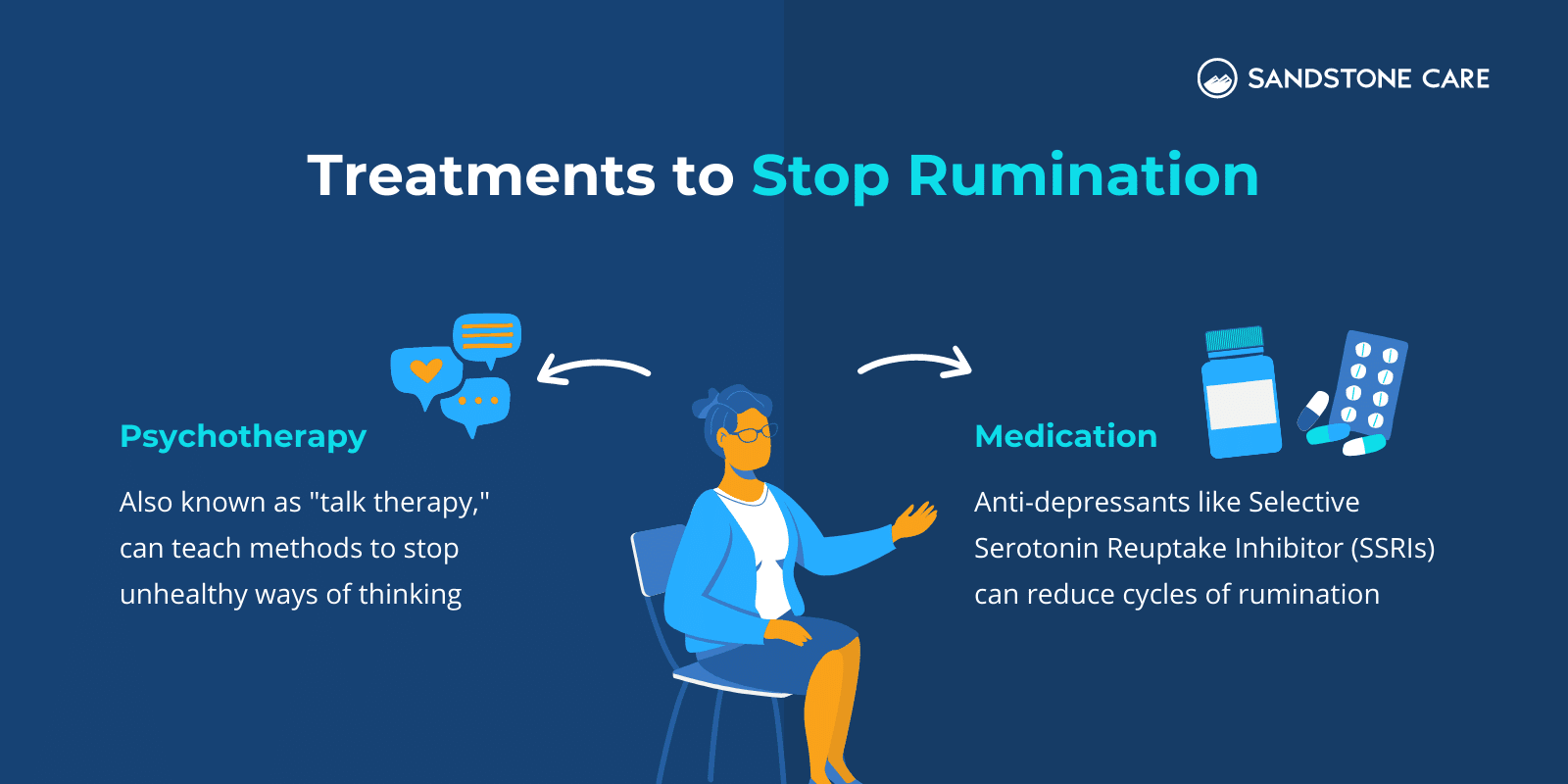
Treatment for rumination most commonly involves a form of psychotherapy and, in some cases, medication.
The most common medication for rumination can include selective serotonin reuptake inhibitors (SSRIs), which are often used to treat depression.
There are different ways to stop ruminating and disrupt the negative loop of thoughts.
Some ways to stop ruminating can include:
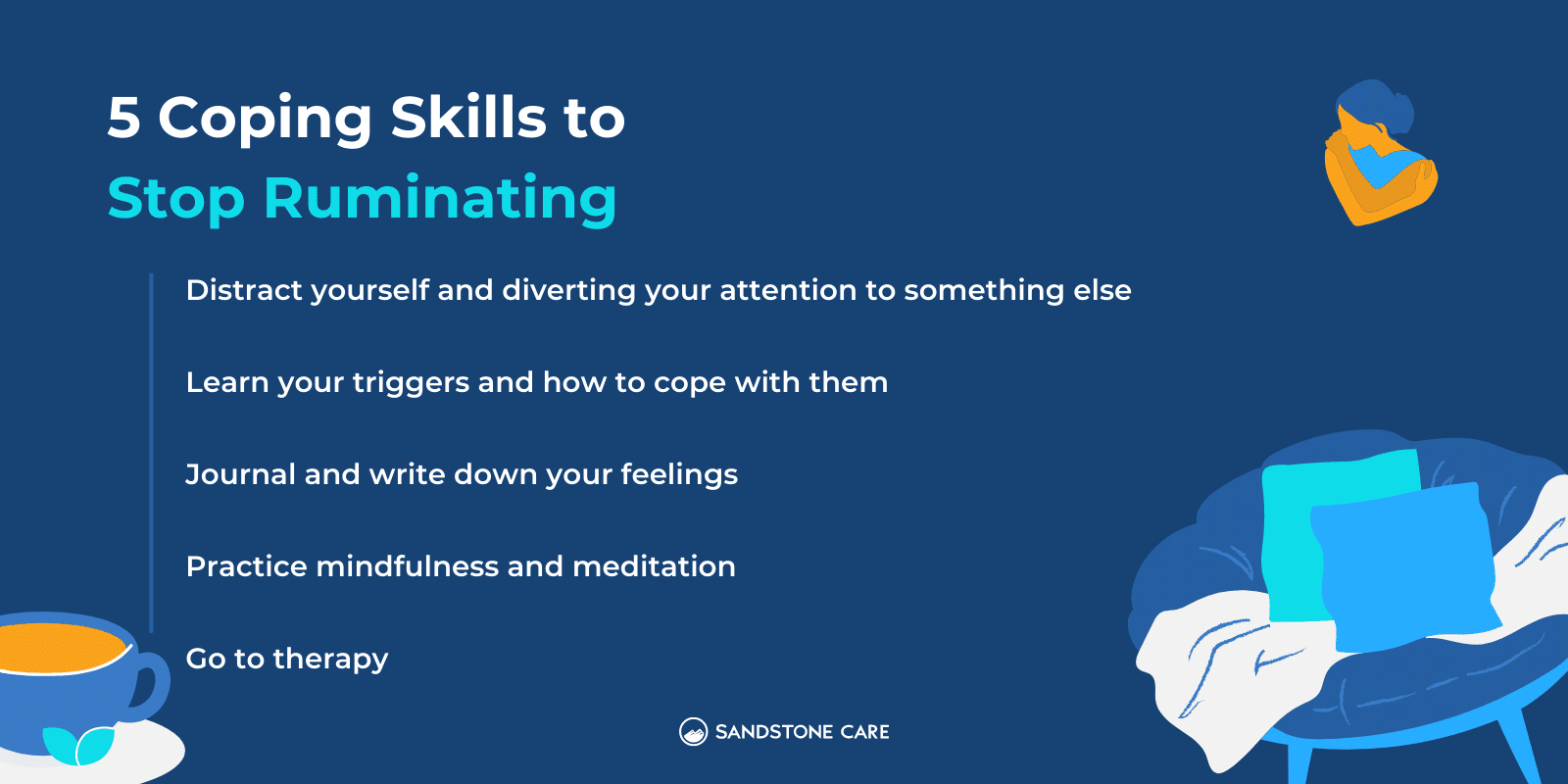
Some antidepressants may be helpful in stopping rumination. However, it is important to consult with your healthcare provider to help decide what the safest and most effective treatment approach is for you.
Cognitive behavioral therapy (CBT) is a common and effective therapy for rumination and is also used to treat a variety of different mental health disorders and substance use disorders.
Rumination-focused cognitive behavioral therapy can help a person with ruminating thoughts learn how to identify negative thoughts and feelings and learn how to interrupt them and change them.
FAQ
Our goal is to provide the most helpful information. Please reach out to us if you have any additional questions. We are here to help in any way we can.
“Ponder” and “contemplate” hold similar meanings to ruminate.
One thing that these three words have in common is that they all refer to a consideration or examination that is done with close attention and deliberately.
A person may ruminate to cope with stress and difficult feelings or events.
When a person meditates, they are often trying to make sense of a negative experience, searching for answers, or possibly trying to figure out where they went wrong so they can avoid it in the future.
However, rumination is often an unhealthy coping mechanism that only ends up making matters worse and creating a cycle of negativity and stress.
Rumination can be a symptom of attention-deficit/ hyperactivity disorder (ADHD) and obsessive-compulsive disorder (OCD).
If a person has ADHD, it can be tough to stop the worrisome thoughts that are causing stress and affecting their daily life.
ADHD rumination can have a big impact on your everyday life and your overall health and well-being.
OCD rumination is similar in the way that the individual gets stuck in a negative loop of worrying or stressful thoughts.
Rumination can come from both ADHD and anxiety.
A person diagnosed with ADHD or anxiety may have the tendency to ruminate. Often about their worries or obsessive thinking.
A person who has experienced trauma may ruminate and have a hard time controlling their thoughts around their traumatic experiences.
As much as they want to forget or stop thinking about it, they may replay the experience in their head, trying to make sense of it all or as a way to process difficult emotions.
The term neurosis is no longer used today because it was used to describe a mechanism rather than an observable behavior.
Having a neurotic personality means being disposed toward emotional instability, self-consciousness, and negative emotions.


Rumination can be linked with negative effects on one’s mental health and overall well-being. Sandstone Care is here to support teens and young adults with mental health and substance use disorders.